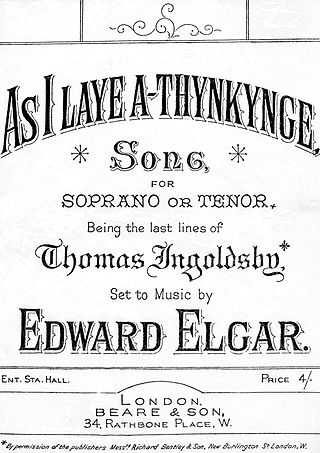This is a list of notable events in music that took place in the year 1959.
This is a list of notable events in music that took place in 1931.
"Pleading" is a poem written by Arthur L. Salmon, and set to music by the English composer Edward Elgar in 1908, as his Op.48.
Was it some Golden Star? is a poem written by Gilbert Parker, published in Volume I of a series of poems called Embers. It was set to music by the English composer Edward Elgar in 1910, as his Op. 59, No. 5.
Twilight is a song with music by the English composer Edward Elgar written in 1910 as his Op. 59, No. 6. Elgar set the words of the poem The Twilight of Love, from Volume 2 of a series of poems called Embers by Sir Gilbert Parker. The Opus 59 songs were part of a song-cycle of six romantic songs by Parker that was never completed – Nos 1, 2 and 4 were never composed. The other songs were Oh, soft was the song and Was it some Golden Star?. The songs were originally written with piano accompaniment, but this was later re-scored by the composer for full orchestra.
Oh, soft was the song is a song with words by Gilbert Parker set to music by the English composer Edward Elgar in 1910, as his Op. 59, No. 3. It is the second and last verse of a poem At Sea which Parker published in Volume I of a series of poems called Embers. The Opus 59 songs were part of a song-cycle of six romantic songs by Parker that was never completed – Nos 1, 2 and 4 were never composed. The other songs were Was it some Golden Star? and Twilight. The songs were originally written with piano accompaniment, but this was later re-scored by the composer for full orchestra.
"A Song of Autumn" is a poem by Adam Lindsay Gordon set to music by Edward Elgar in 1892.
"A Child Asleep" is a song, with lyrics from a poem written by Elizabeth Barrett Browning. It was set to music by the English composer Edward Elgar in December 1909 and published in 1910 by Novello. It was first published by Browning in 1840.

"As I laye a-thynkynge" is the last poem written by "Thomas Ingoldsby". It was set to music by the English composer Edward Elgar.

In the Dawn is a song written by the English composer Edward Elgar in 1901 as his Op.41, No.1.
”Speak, my Heart” is a poem by Arthur Christopher Benson, set to music by the English composer Edward Elgar in 1902.

"Come, Gentle Night!" is a poem by Clifton Bingham set to music by the English composer Edward Elgar in 1901.

”Always and Everywhere” is a song by the English composer Edward Elgar with words translated from the Polish of Zygmunt Krasiński by Frank H. Fortey. It was composed and published in 1901.

"After" is a song written by the English composer Edward Elgar in 1895, as his Op. 31, No. 1, with the words from a poem by Philip Bourke Marston.

The Starlight Express is a children's play by Violet Pearn, based on the imaginative novel A Prisoner in Fairyland by Algernon Blackwood, with songs and incidental music written by the English composer Sir Edward Elgar in 1915.

"In Moonlight" is a song with music written by the English composer Edward Elgar in 1904 to words from the poem "An Ariette for Music. To a Lady singing to her Accompaniment on the Guitar", by Percy Bysshe Shelley (1792-1822) and published in 1832.
Diarmuid and Grania is a play in poetic prose co-written by George Moore and W. B. Yeats in 1901, with incidental music by the English composer Edward Elgar.

Caroline Alice, Lady Elgar was an English author of verse and prose fiction, who married the composer Edward Elgar.








